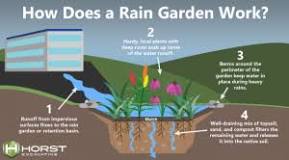
So what is a rain garden, anyway? A simple definition is a sunken, basin-like area in the landscape that collects rain water from a roof, driveway or street and allows it to soak into the ground. Planted with grasses and flowering perennials, rain gardens can be a cost effective and beautiful way to reduce runoff from your property.
Rain gardens are especially effective in their ability to remove up to 90% of chemicals and up to 80% of sediments from the rainwater runoff. Compared to a conventional lawn, rain gardens allow for 30% more water to soak into the ground.
While there are many advantages to rain gardens, a potential disadvantage are issues with drainage. In these instances, rainwater runoff will accumulate in the basin, which can lead to backups and flooding. An improperly designed basin can also lead to increased erosion rates.
Rain gardens are created by building a berm (a mound or wall of earth or sand, typically at the top or bottom of a slope) in a low spot in the yard, and then building a swale (a shallow channel with gently sloping sides) to channel runoff from the gutters and higher parts of the yard. The water will then be absorbed into the soil through the network of deep plant roots.
At our rain gardens workshop on November 4, landscape architect Dave Phelps will reveal the benefits of rain gardens and teach you how to make the most of the rain we get, recharge your landscape's moisture banks while enhancing the value to wildlife, and select the right plants, rocks, and other materials for the project.
This workshop series is co-sponsored by Contra Costa Water District.
Replies